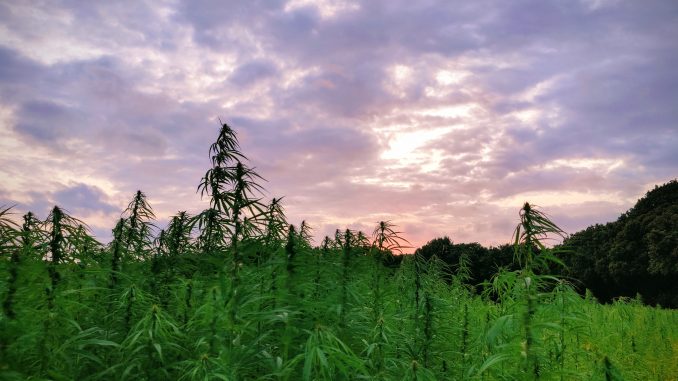
Hemp is an ‘ecological wonder plant’ with almost endless potential as a sustainable raw fibre material, not to mention its intriguing nutrient profile and therapeutic benefits. It can even decontaminate radioactive soil. Yet in many jurisdictions, hemp production is hampered by baffling constraints. Where UK farming policy appears to bypass common sense, growers are taking the law into their own hands.
A plant that grows quickly and resiliently without inputs, actively improves soil health, increases yields of subsequent crops and is said to have 50,000 different applications including food, fibre, medicine and carbon negative construction: surely hemp should be considered a natural miracle crop.
Imagine, then, the heartbreak and frustration when the UK’s Hempen were legally compelled to destroy a 16ha yield worth £2.4m (€2.89m). It’s no wonder that the progressive farming co-op have launched a campaign intending, first off, to sidestep domestic law and, ultimately, to force its hand. Overgrow the Regime seeks to overcome reactionary government regulation through mass civil disobedience.
Its headline message? Grow hemp wherever, however you can: for nature, climate, British farming; for resilient landscapes and communities.
The first cultivation of hemp dates back to China c.2700 BC; it goes on to have a long and significant history in the UK. There’s evidence of widespread growth across the country from the Middle Ages; 16th century were ordered to grow hemp to support the navy’s sail and rope needs, with a large fine for those that didn’t meet the production quota of ¼ acre / 0.1ha (historically, one ‘rood’) for every 60 acres / 24ha owned.
Now, though, it’s all but eradicated following outlawing of the crop in 1928. Although growing was re-legalised in 1993, hemp suffers from the stigma of its relationship with narcotics. Industrial hemp contains insignificant levels of the psychoactive component THC present in other strains of the cannabis family. Yet hemp is still defined as a Controlled Substance in the UK: regulation is managed by the Home Office under Drugs & Firearm Licensing despite the WHO stating it poses no threat to human health and the UN advising it should be exempt from all internationally controlled substance lists (Convention on Narcotics, 1961/71).
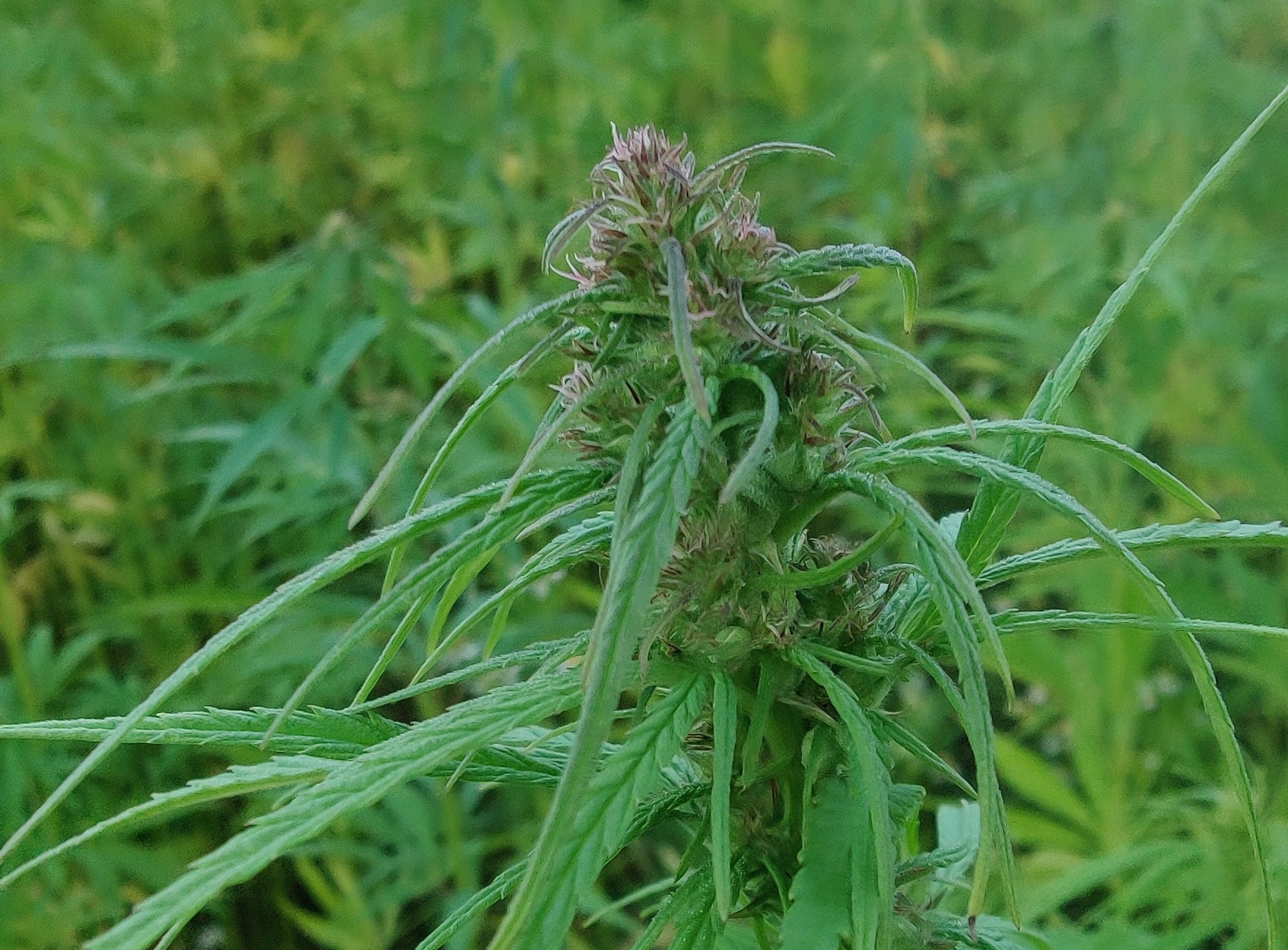
Ecological wonder plant
The constraints on hemp production appear even more senseless considering its value and versatility. Hemp positively impacts the environment and benefits the low impact farmer: Innovative Farmers call it an ‘ecological wonder plant for UK farming’. The resilient plants require minimal inputs, no pesticides and very little irrigation. Rapid, abundant growth – reaching up to 3m in 3 months – naturally shades out weeds. Deep tap roots, delving nearly 3m below the surface, mine leached nutrients and reinvigorate the soil whilst combatting soil erosion and compaction. Research suggests 15-20% greater cereal crop yields following hemp cultivation. As a seed crop, plants are harvested later in the season, reducing machine pressure on the land. Hemp straw is effective animal bedding.
With the boom in CBD product popularity – medical applications of the cannabinoid compound extracted from hemp flowers include benefits to mental health, insomnia, chronic pain, neurological conditions and more – the profit potential for farmers is also impossible to ignore. Its unique nutritional properties, as a complete protein containing all 9 essential amino acids, vital omegas and a rich variety of vitamins and minerals, suggest its potential as a valuable, sustainable local food source.
Looking at the environment, the plants provide a wealth of gains for biodiversity including seed-rich crops that encourage farmland birds and pesticide-free fields, helping insects to thrive. Cambridge University research suggests hemp is “one of the best CO2-to-biomass converters,” capturing atmospheric carbon twice as effectively as trees, at 8-15t CO2/ha within 100 days of growth. An equivalent crop can produce four times the amount of paper as trees in a fraction of the time. Converted to hempcrete, it is effectively a carbon-negative building material; it can also produce a biodegradable plastic alternative.
Hemp also provides a sustainable raw fibre material: an ecologically-sound alternative to cotton, one of the world’s most toxic and thirsty crops. In fact, hemp goes further than non-toxic: it’s a useful ‘mop crop’ that clears impurities from land and wastewater; a research scientist at the Chernobyl nuclear disaster site stated, “Hemp is proving to be one of the best phyto-remediative plants we have been able to find.”
The list goes on. As Hempen co-founder Joe McGahan puts it: “Hemp makes a mockery of the phrase ‘Jack of all trades, Master of none.’ It’s an absolute Jedi master of everything it turns its attention to!”
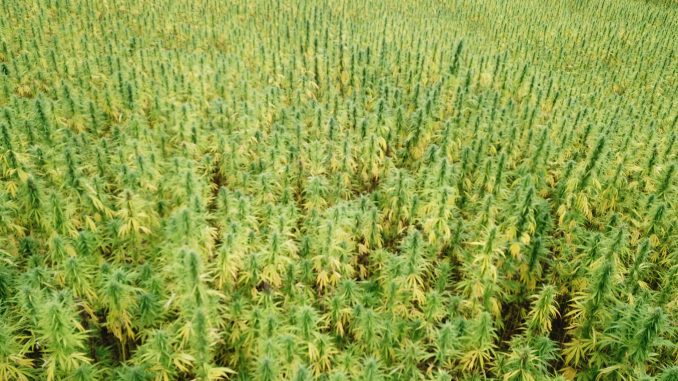
Recognising hemp’s potential
Over 30 countries worldwide recognise the glorious potential of industrial hemp, including China which contributes 70% of global output; and the USA which produces at scale following the forward-thinking reclassification of hemp in the 2018 Farming Bill from a schedule 1 drug to an agricultural commodity.
Europe cultivated 34,960ha in 2019; 70% of these are in France, where reasonable hemp farming policy has enabled the country to climb the ranks to 4th top producer globally. It employs a cooperative model, with six large farmer-member coops operating around regional processing hubs to produce predominantly fibre. “It’s something we could learn a lot from” says McGahan. “It’s where the UK could be with investment and supportive, encouraging government policy.”
Jersey is another country working to maximise hemp’s potential. “The island is a good, geographically close, example of how small changes to licensing can kickstart the hemp sector and positively impact production,” says McGahan. The licensing regime has recently changed so growers can now harvest seed and stem, and allow the plants to produce flowers. Unlike the UK, there are no restrictions on crop site. The country is working in collaboration with the British Home Office: “Hopefully they’ll take notes and make changes in the UK as a result,” says McGahan.
Yet the UK seems to be moving backwards, if anything, in terms of regulation. There are no plans to transfer regulation from Drugs & Firearms to the Department for Farming & Rural Affairs (DEFRA). There are threats to reduce the legally tolerated THC level from 0.2% to 0.01%, rather than revising upwards as many other countries are doing. The overarching licensing process is cumbersome, expensive, and out of step with farming seasons; the system as it stands currently is prohibitive to grass roots and small-scale producers.
In part 2 of this series, Ursula Billington meets a farmer who has built a house from hempcrete, and a research farm that makes the case for relaxing licensing around hemp.
More from the UK
Bristol Bites Back | Fruits & Roots of Radical Resilience in South-West England
Oxford Real Farming Conference 2022 | New Dawn For Solidarity
UK Post-Brexit Farm Schemes – Revolution, Evolution or Anti-climax?
The True Cost of Britain’s Addiction to Factory-Farmed Chicken



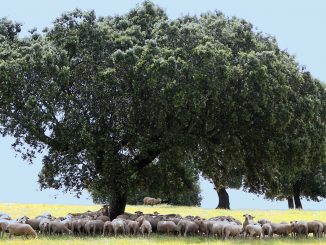
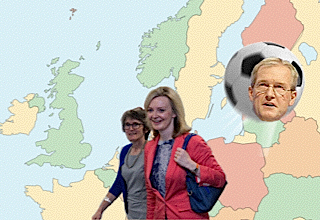
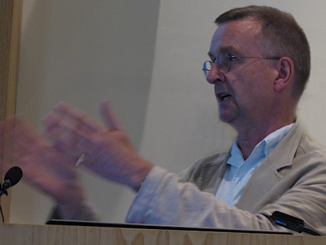
1 Trackback / Pingback
Comments are closed.